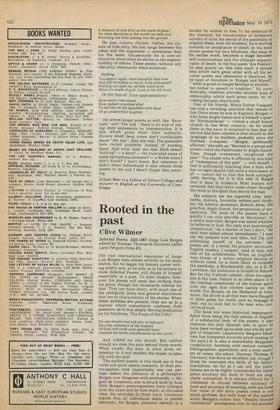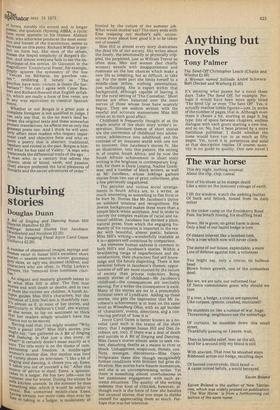Rooted in the past
Clive Wilmer
Selected Poems 1923-1967 Jorge Luis Borges edited by Norman Thomas di Giovanni (Allen Lane Penguin Press £5) The vast international reputation of Jorge Luis Borges rests almost entirely on his short stories, but he began his literary career writing poetry and, as he tells us in his preface to these Selected Poems, still thinks of himself essentially as a poet. To most readers, however, his poems will seem less striking than his prose, though not necessarily inferior for that. They are more direct, with much less of the ambiguity, irony and general elusiveness that are so characteristic of the stories. When these qualities are present, they are so in a manner which immediately confesses their presence, as in that deeply moving meditation on his blindness, 'The Poem of the Gifts': No one should read self-pity or reproach Into this statement of the majesty Of God, who with such splendid irony Granted me books and blindness at one touch.
And indeed no one should. But neither should we miss the pain behind those words. What cloaks the pain is what gives expression to it and enables the reader to identify with the poet.
The earliest poems in this book are in free verse and quite openly romantic. In their preoccupation with immortality one can perhaps detect the influence of' a philosopher Borges now disagrees with profoundly — Miguel de Unamuno, one is struck both by how little Borges's preoccupations have changed over the years and by how much, at the same time, his attitudes to them have. Unamuno argues that all individuals desire to persist eternally; for Borges, personal identity is a burden he wishes to lose. In his embrace of the classical, his renunciation of deliberate novelty of style, his denial of the possibility of original ideas, even his modesty, he is moving towards an acceptance of death. In his most recent poems his own blindness, like sleep in his earlier work, becomes a stage between self-consciousness and the ultimate impersonality of death. In his fine poem 'Ars Poetica', he sees poetry as, like time itself, a stream into which each great artist with all his peculiar quirks and obsessions is dissolved. As he says of literature in 'Borges and Myself', "what is good no longer belongs to anyone... but rather to speech or tradition." So, para
doxically, tradition provides another kind of immortality which each great artist, by invoking the past, reactivates.
One of his friends, Maria Esther Vasquez. has told a revealing anecdote that relates to this. Once when he was in England, Borges — who loves Anglo-Saxon and is himself a quarter 'Northumbrian' — visited a small Saxon church in the West country. As he stood .there in the nave, it occurred to him that no service had been uttered in that church in the language of its builders, probably since the Norman Conquest. "Borges, profoundly affected," she tells us, "Recited in a proud and solemn voice the Paternoster in Anglo-Saxon. Time, though evanescent, recaptured the past." The reader who is affected by this kind of "redemption of the past" — and myself, I find it sufficiently touching that a man who has no sight should visit such a monument at all — cannot fail to find this book unforgettably moving, for it is this side of Borges that is most in evidence. Most readers will certainly feel they have come closer through the verse to the spirit that moves the man.
His subjects are the expected ones: labyrinths, mirrors, favoUrite writers-and thinkers, his historic ancestors, Buenos Aires, the gauchos, Anglo-Saxon, the perplexities of metaphysics. Yet most of the poems have a quality I can only describe as 'devotional'. In a recent interview, Borges was asked whether he believed in God. His reply was surprisingly unequivocal: "As a matter of fact I don't," he said; then added almost immediately, "I may say my prayers now and then, but I'm just addressing myself, or the universe." His poems are, in a sense, his prayers: devotions. English readers, I suspect, tend to miss this side of his achievement. When an Englishman thinks of a writer religious beyond or without creed, he is more likely to consider the pantheist, a Wordsworth, say, or a D. H. Lawrence; the numinous is located in Nature. But for the 'Catholic atheist', often the opposite is the case. Nature is an alien place; it is the timeless community of the human spirit over the ages that confers sactity on the world. For Borges, as for Mallarme or Unamuno, the divine is all that men have thought in their quest for truth; and so homage is paid, snoof GttoodGod, but to the man who con The book has some historical importance. Apart from being the first edition in English of a substantial body of the poems, it also contains the only Spanish text in print to have been revised up-to-date and wholly purged of misprints. (Apparently Borges's blindness has hampered accurate proof-reading in the past.) It is also a remarkably Borgesian compilation, bursting with textual variants, bibliographies, appendices, and a most useful set of notes; the editor, Norman Thomas di Giovanni, has done an excellent job, though 1 think he overrates the skills of his fellowtranslators. As far as I can tell, the translations are to be highly commended for literal prose accuracy but most of them are singularly uninspired. It is always difficult for a translator to choose between accuracy of form and accuracy of meaning, with the loose free verse of the early poems there is not much problem, but with most of the mature work, Borges's notion that "Reality favours symmetries" predisposes him to the strictest of forms, notably the sonnet and, in longer Poems, the quatrain rhyming ABBA, a cyclic for, "II, most apposite to his themes. Alastair Reid, who otherwise produces the most sensitive and honest of the translations, seems to ine weak on this point. Richard Wilbur is perfect on form but, like most of the others, Misses the limpid simplicity of Borges's dictiOn. And almost everyone fails to see the imPlicationsi of /his syntax. Di Giovanni in the Magnificent 'Conjectural Poem', for example, niply ignores the symmetry of the line Vencen los Barbaros, los gauchos yenceo rendering it lamely as "The gauchos have won:/victory is theirs iHe barbarians'!" Nor can I agree with Cesar Renpert and Richard Howard that English syllab!cs, which are really a form of free verse, are in any way equivalent to classical Spanish Metre.
Whether or not Borges is a great poet a Complete foreigner is not qualified to judge. I an only say that, in the no man's land be Lween the original texts and these somewhat prosaic translations, he affects me as only the greatest poets can. And I think he will similady affect most readers who respect imper sonal craft and objective form and who re
quire a poetry that is abstract, traditional, lapidary and rooted in the past. Borges is him
self what he has said of Valery; "A man who
transcends the differential traits of the ego ... Man who, in a century that adores the Chaotic idols of blood, earth, and passion,
(has] always preferred the lucid pleasures of thought and the secret adventures of order."



































 Previous page
Previous page